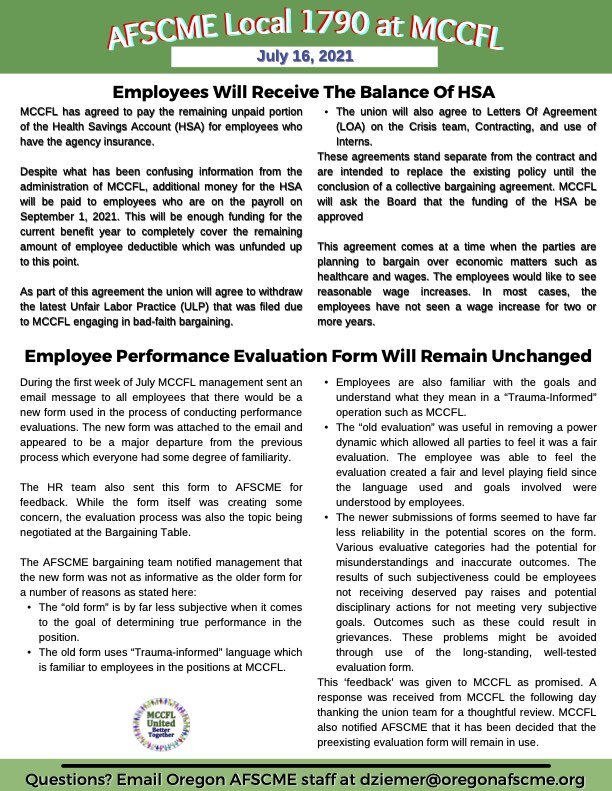Small Victories, High Tensions at MCCFL and MCCFL Union Bargaining Table
MCCFL building.
Tensions have mounted at the bargaining table as Mid-Columbia Center for Living (MCCFL) and its recently formed union continue to struggle in resolving negotiation difficulties surrounding the creation of a ‘first contract’ between MCCFL and the Union.
A recent press release from the MCCFL Union representatives claimed that the organization was in a ‘crisis’ with ‘continued labor law violations and massive turnover rates’ which are dramatically affecting both workers and those who rely on MCCFL services.
“It seems like every day someone else leaves, and it’s no surprise why people are leaving, MCCFL says they have no money, but the Executive Director recently received a 7% raise,” said Daniel Vázquez.
A Union press release alleged that MCCFL negotiators had engaged in obstructive behavior in the bargaining process which has dragged on for nearly 11 months and that there were several unfair labor practice charges pending against MCCFL.
Oregon ACSFME and acting MCCFL Union Representative Dennis Zeimer said that although the bargaining process over the creation of a first contract was taking a long time, he did not consider it to be an unusually long time.
“In my experience, first contracts can take a long time to negotiate,” said Zeimer.
He said however what he did find unusual about the process was the lack of MCCFL employees at the bargaining table.
Strangely, no MCCFL employees regularly take part in the bargaining. “June Gower isn’t at the bargaining table. Neither is anybody else except for their outside attorney Doug Parker and former HR director Keith Howes,” said Zeimer.
MCCFL Executive Director June Gower responded to the Union’s press release claiming MCCFL was in crisis saying that the press release was full of “misstatements” and “gross exaggerations” and that she was “at a complete loss as to why the Union sent out a press release that is so obviously at odds with the bargaining situation and recent settlement’.
Gower also said that claims MCCFL negotiators had engaged in obstructive behavior and had pending unfair labor practice charges were false. Gower also said that MCCFL negotiators and the Union had reached a settlement the same day that the Union had sent out the press release claiming the organization was in crisis.
“On Tuesday morning July 6th, following the Independence Day holiday, the Union accepted MCCFL’s offer. In the July 6th settlement the Union also agreed to withdraw an unfair labor practice charge it filed in June,” said Gower.
The offer to withdraw the charge came “After MCCFL had said, that if the Union would not agree to allow several on-call crisis response counselors to be hired, MCCFL would be forced to do as it has in the past – assign the evening and weekend work to current mental health employees,” said Gower.
“Gower sent a memo to employees telling everybody that was qualified to cover crisis work, that they would be required to do so,” said Zeimer. “Which was a definite deviation from maintaining the status quo during the bargaining period which prompted an unfair labor practices complaint.”
What is Maintaining the Status Quo?
According to the University of California. “The status quo requires the.. (University, Business, Organization) to maintain the same wages, hours and terms and conditions of employment for represented bargaining unit employees that existed at the time the contract expired, until an agreement with the union is reached.”
Failing to maintain the status quo, can prompt an unfair labor practices charge.
Loss prevention of full-time positions through their conversion to part-time positions is something the union has continued to fight for. However, MCCFL, like many organizations, has been looking to cut costs and boost profitability by hiring on-call or “as needed” per-diem workers which do not qualify for full-time workers’ benefits. But such hiring practices have continued to be a contentious issue at the bargaining table as they are a break from the “status quo” which is required to be maintained while still negotiating a first contract with the union.
Understaffing continues to plague the mental health industry across the state and Gower admits that MCCFL is no exception to the rule.
“MCCFL is far from being the only mental health care provider confronting an acute shortage of qualified mental health employees,” said Gower. “ Oregon, like much of the country, is facing an increasing shortage of qualified mental health workers.”
Gower criticized the Union’s press release saying that the Union was holding critical services hostage.
“This is astonishing hypocrisy considering that the Union sought to hold hostage such critical county services as suicide prevention through crisis coverage to meet its money demands,” said Gower “It is time that AFSCME recognizes that the people it represents have serious community roles to fulfill and not let Union tactics disrupt the provision of critical services.”
The money demands Gower refers to involved the payout of an employee Health and Savings account.
The Union said they were looking to negotiate a new insurance policy that would not have an HSA and so wanted MCCFL to pay the current unpaid balance of the HSA prior to switching to another insurance with lower deductibles, better coverage, and no health and savings account. Zeimer said that at the same time they were negotiating this and getting nowhere, MCCFL Crisis Services (which are responsible for providing suicide prevention services) experienced a staffing crisis.
“We had been working on getting the HSA paid to employees and getting better healthcare coverage for MCCFL workers for months and gotten nowhere despite it being cheaper and better coverage. Then as we were drafting the HSA payout proposal several people quit in the crisis center. Crisis services were in crisis,” said Zeimer
MCCFL sought to address the crisis by hiring per-diem (part-time, unbenefited) employees. However, making changes in hiring practices while the Union was still negotiating their first contract with MCCFL constituted a ‘break from maintaining the status quo.
“Which prompted an unfair labor practices complaint, because changes to hiring first have to be negotiated with the union,” said Zeimer.
Zeimer said that they understood that Crisis Services were in need of help and so they quickly drafted a solution that would allow for temporary part-time workers who would have the option to be brought on as full-time benefited employees later down the road. He said that MCCFL didn’t respond to the proposed solution for nearly three weeks. He said he felt it was likely because the proposal included the Union’s HSA payout proposal which they had been drafting at the time.
“That is when the word ‘hostage’ and the implication that we were holding crisis services ‘hostage’ was first used at the bargaining table,” said Zeimer. “That was the most heated I’ve seen it get.”
MCCFL eventually agreed to the Union’s proposal to hire per-diem employees on a temporary basis, and agreed to pay the remaining unpaid portion of the Health and Savings Account for employees who have agency insurance. As a part of that agreement, the Union rescinded its related unfair labor practices and bargaining in bad faith complaints.
The Union said its next step involves continuing to negotiate health care and pay increases for all MCCFL employees.
Some Background
The tension surrounding negotiations (including those surrounding hiring of part-time/on-call and per-diem employees) has its roots in a ruling that came for the Oregon Employee Relations Board (ERB) earlier this year. MCCFL came under fire from the (ERB) for opposing MCCFL employee’s efforts to unionize. MCCFL was found to have spent $1,000 in public funds in order to distribute anti-union flyers to its employees while unilaterally modifying working conditions without notifying and bargaining with the union.
The ERB ruled that MCCFL had broken the law when it tried to prevent the formation of a union at their workplace. MCCFL then paid a civil penalty settlement of $3,000 to the Union. As a part of the agreement, MCCFL also rescinded their new employee manual and agreed to not create any new provisional or so-called 'per Diem jobs while bargaining over the loss of the Adults with Intellectual and Developmental Disabilities Program.
Dennis Ziemer, Oregon AFSCME union representative for the MCCFL union said that following the union formation it was rumored that MCCFL Executive Director June Gower “was upset about the employees unionizing and was going to take a shot at them by trying to jettison the IDD program (Intellectual and Developmental Disabilities) program back to the state as a retaliatory act.”
Gower recently disputed rumors that the return of the IDD program to the state had anything to do with retaliation and instead said that plans to return the IDD program over to the state had occurred prior to the Union forming, saying the plans to return the program back to the state are what prompted the Union to file charges against MCCFL in the first place.
“Last fall, the Union tried to prevent MCCFL from returning a money-losing program to the state by filing charges with ERB,” said Gower.
“After several days of the hearing, the parties agreed to settle all charges by the Union dismissing the main issue that the Union had filed. In order to gain the Union’s agreement, MCCFL agreed to a lesser charge that had absolutely nothing to do with the parties’ collective bargaining and agreed as part of that to pay a $3,000 penalty,” said Gower. “This seemed a far more prudent result than engaging in multiple additional days of hearings. After that settlement, AFSCME filed a petition with the ERB asking to have its lawyer’s fees reimbursed. ERB awarded $37,000 in fees to AFSCME for its attorney who himself had recently been an ERB Board member.”
However despite tensions stemming from past difficulties, Zemier said he hopes that now that MCCFL employees have a union that AFSCME can continue to work towards bringing better wages, healthcare, and a better, healthier, and equitable environment for MCCFL employees.


